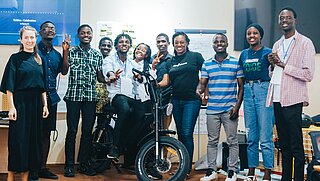Design Sprint for “Made in Ghana” e-mobility solutions

Students from various universities in Ghana are developing prototypes for sustainable charging stations for electric mobility.
Eight young students emerged as the winners of the first Design Sprint organized by Impact Hub Accra in collaboration with Siemens Stiftung. Launched on October 10, 2022 in Accra, the five-day workshop saw 31 final-year students from different Ghanaian universities and fresh graduates develop prototypes for sustainable e-mobility charging facilities. The program is funded by the German government’s International Climate Initiative (IKI) to facilitate the decarbonization of transportation in Ghana.
Design Sprint under the motto "Charge 2022"
Impact Hub Accra, a center for innovation and entrepreneurship and Siemens Stiftung launched the initiative Design Sprint under the motto “Charge 2022” to enable the next generation of Ghanaian sustainable technology and mobility enthusiasts to work on practical and implementable electric mobility ideas. The program invited applications from students studying in technical universities and recent graduates who participated in group as well as individual exercises to develop solutions. During the week-long program, they worked with industry experts, mentors and academics who coached them on hands-on technical and product development aspects.
Will Senyo, CEO of Impact Hub Accra said: “Our aim for the IKI Cargo Bikes project is to promote the use of e-cargo bikes in Africa as a viable means of transport. The week-long Design Sprint program sought to engage young people to provide innovative solutions that will revolutionize the transport industry. For 12 months, the eight winners will join our team to develop their skills and capabilities and ultimately help us get closer to our mission. We are passionate about sustainable solutions, and continuously partner with local and international institutions to support inclusive growth in West Africa and beyond".
The prototype from the student team “AK LAB” won the competition, teams “Flash Ride” and “Proton” were placed second and third respectively. Students were competing to develop a charging station unit with a total cost limit of €7,000 with the capacity to charge eight to ten 48V 21Ah e-bike batteries simultaneously. The competitors were encouraged to primarily use recycled and locally available materials.
A step towards the expansion of electromobility in West Africa
“The aspiration is that the ideas developed should be embedded in circular economy principles. We want to facilitate the production and dissemination of climate-friendly mobility systems along with nurturing Ghana’s vast youth population in future growth areas in the green economy. The exchange of experiences through our three-year program "Cargo bikes Made in Ghana” will contribute to the further expansion of the electric mobility ecosystem in West Africa”, adds Marah Köberle, Senior Project Manager Development Cooperation at Siemens Stiftung and member of the jury that selected the best projects.
Green and clean mobility and transport are vital to achieving Sustainable Development Goal (SDG) 11 on sustainable cities and communities along with supporting the implementation of other SDGs such as access to education or health. To support the transformation in Ghana’s transportation sector, Impact Hub Accra and Siemens Stiftung launched the joint project "Cargo Bikes: Made in Ghana” in 2021 to introduce electric cargo bikes and encourage sustainable production in the country. They are working with regional institutions, businesses, academics and administration on advocacy and technical issues to foster more sustainable, accessible, inclusive, and efficient urban transportation.
The link has been copied to the clipboard
Contact
IKI Office
Zukunft – Umwelt – Gesellschaft (ZUG) gGmbH
Stresemannstraße 69-71
10963 Berlin




